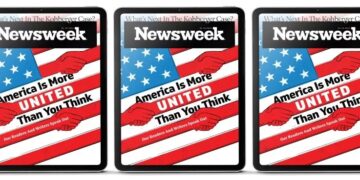Category: Archives
Is America More United than You Think? What Readers Told Us
Eli Steele in Newsweek:
 The media headlines of the past year suggest that things have gotten a lot worse since 2017—and both Thomas and Fox played a part in the divisiveness. But if you look beyond the headlines, including those on Newsweek, a different picture emerges. Even in what feels like an angry, factionalized society, there are signs of unity.
The media headlines of the past year suggest that things have gotten a lot worse since 2017—and both Thomas and Fox played a part in the divisiveness. But if you look beyond the headlines, including those on Newsweek, a different picture emerges. Even in what feels like an angry, factionalized society, there are signs of unity.
…”My genuine belief is that most Americans don’t really think much about politics, and to the extent they do, they are largely united in the agreement that they dislike it. As a nation, we are far more concerned with celebrity gossip and sports than we are with culture wars or wonkish policy debates. That’s why the average American could almost certainly name more of Pete Davidson’s former lovers than they could members of Congress. Most of the division that we see is manufactured and amplified by a media ecosystem that primarily feeds off of anger and fear. This is particularly true for cable news, which thrives off of a constant stream of outrage porn that rarely befits the designation of journalism. Even so, the fact remains that the overwhelming majority of Americans don’t ever tune in to these outlets. For example, the most successful shows on Fox News, the leader in cable news viewership, only commands an audience that is about one-third the size of the most popular sitcoms on CBS. As a college professor who has taught overtly political topics for years, I’ve also experienced evidence of this united spirit of indifference toward politics that most Americans innately possess. In a classroom of 35 students, maybe four or five on average will routinely speak up and express strong opinions about anything political. The other 85 percent of the class just sits back and hopes they don’t get called on.”
—Nicholas Creel, assistant professor of business law at Georgia College and State University
More here.
What You Don’t Know About Sperm
David Barash in Nautilus:
 Sperm don’t get much respect. They’re little more than a bare-bones package of DNA outfitted with a lashing tail. And they’re produced in such vast numbers that no single pollywog counts for very much. We all know about their co-starring role in reproduction. But as a 2023 Nature paper underscores, sperm represent some of the most extraordinary and counterintuitive processes of evolution—which got us all here in the first place. So maybe it’s time we get to know sperm better.
Sperm don’t get much respect. They’re little more than a bare-bones package of DNA outfitted with a lashing tail. And they’re produced in such vast numbers that no single pollywog counts for very much. We all know about their co-starring role in reproduction. But as a 2023 Nature paper underscores, sperm represent some of the most extraordinary and counterintuitive processes of evolution—which got us all here in the first place. So maybe it’s time we get to know sperm better.
To begin with, spermatozoa not only embody the reproductive prospects of males who make them, they have remarkable agency in themselves. Evolutionary biologists have long known that among many species, males compete with other males, the ultimate fitness payoff being that winners will get to project their genes (via their sperm) to the next generation. But competition is also being waged inside male bodies. Sperm battle to fertilize a female’s egg, but they continue to battle even after copulation, perhaps for their own evolutionary payoff.
More here.
Being, Univocity, & Logical Syntax
Why We Love/Hate Brutalist Architecture
Ashley Gardini at JSTOR Daily:
 Brutalist architecture. You either love it or hate it, right? However you feel, we can all agree that Brutalism is an architectural style that continues to elicit strong reactions some seventy years into its existence. At times, it seems like everyone hates it. Take, for instance, Ian Fleming, who named one of the James Bond villains Goldfinger after Ernő Goldfinger, the architect best known for London’s Brutalist Trellick Tower. Or how about the incredible difficulties faced by preservationists when it comes to saving important Brutalist structures? Neither Paul Rudolph’s Orange County Government Center nor Alison and Peter Smithson’s Robin Hood Gardens, both Brutalist icons, were preserved successfully. On the other hand, Brutalism has entered our everyday lexicon. From books to fashion to household decor, you can buy a Brutalist version for yourself. It seems that the influence of Brutalism is here to stay.
Brutalist architecture. You either love it or hate it, right? However you feel, we can all agree that Brutalism is an architectural style that continues to elicit strong reactions some seventy years into its existence. At times, it seems like everyone hates it. Take, for instance, Ian Fleming, who named one of the James Bond villains Goldfinger after Ernő Goldfinger, the architect best known for London’s Brutalist Trellick Tower. Or how about the incredible difficulties faced by preservationists when it comes to saving important Brutalist structures? Neither Paul Rudolph’s Orange County Government Center nor Alison and Peter Smithson’s Robin Hood Gardens, both Brutalist icons, were preserved successfully. On the other hand, Brutalism has entered our everyday lexicon. From books to fashion to household decor, you can buy a Brutalist version for yourself. It seems that the influence of Brutalism is here to stay.
more here.
A Conversation With Israeli And Palestinian Activists
The Editors at The Point:
In this issue, in lieu of our own commentary, we have decided to publish a conversation that took place on October 24th between Israeli and Palestinian activists. In the nearly two months since, the conflict has continued and deepened, notwithstanding the week-long “pause” for the exchange of hostages and political prisoners at the end of November. As we finish this issue, Israel’s aerial bombardment of Gaza and ground war are ongoing, resulting in a humanitarian crisis and the deaths of a reported sixteen thousand Palestinians, while Hamas and affiliated groups still hold 136 hostages abducted from Israel. Yet these developments have done little to alter the backdrop under which this dialogue was convened—a “very dark passage,” in the words of moderator Charles Lenchner—while only making even more urgent its central themes. We recommend it for many reasons: because the speakers’ understanding of the situation is extensive, nuanced and personal; because they are not addressing captive, convinced audiences but each other; because they are attempting, as they speak, to come to terms with both the possibilities and the limitations of their power; because the stakes for them are in no way symbolic or abstract; because they speak, credibly, as if their lives depend on what they say and do.
more here.
Tuesday, January 9, 2024
Love in the sickle cell capital of the world
Krithika Varagur in The Guardian:
 Nigeria is the sickle cell capital of the world. Its residents account for about half of all new cases of severe haemoglobin disorders worldwide. And SCD is one of the world’s most prevalent autosomal recessive genetic disorders; the sickle cell trait is more than six times more common in Nigerians than the cystic fibrosis gene is among people of northern European descent, or the Tay-Sachs gene among Ashkenazi Jews.
Nigeria is the sickle cell capital of the world. Its residents account for about half of all new cases of severe haemoglobin disorders worldwide. And SCD is one of the world’s most prevalent autosomal recessive genetic disorders; the sickle cell trait is more than six times more common in Nigerians than the cystic fibrosis gene is among people of northern European descent, or the Tay-Sachs gene among Ashkenazi Jews.
In the 1950s, a number of scientists speculated that the sickle cell trait confers some resistance to malaria – now a widely accepted theory – which would account for the prevalence of the gene in sub-Saharan Africa, home to more than 90% of all malaria cases in the world. Over millennia, according to this hypothesis, as more AS than AA children survived acute malaria infections and reached reproductive age, they passed on their single S genes. But for those with two such genes, the potential complications include acute pain episodes, acute chest syndrome, strokes, priapism, jaundice, numb chin syndrome, an enlarged spleen, leg ulcers and blindness.
More here.
Advances in Mind-Decoding Technologies Raise Hopes (and Worries)
Fletcher Reveley in Undark:

In the last 10 years, the field of neurotechnology has proliferated at an astonishing pace. According to a report by NeuroTech Analytics, an industry research firm, annual investment in the sector increased more than 20-fold between 2010 and 2020, rising to more than $7 billion per year. Over 1,200 companies have crowded into the space, while large-scale government efforts, such as former president Barack Obama’s BRAIN Initiative, have unlocked billions in public funding. Advances in the field have proved life-changing for individuals living with conditions like Parkinson’s, spinal cord injury, and stroke. People who cannot speak or type due to paralysis have regained the ability to communicate with loved ones, people with severe epilepsy have significantly improved their quality of life, and people with blindness have been able to perceive partial vision.
But in opening the door to the brain, scientists have also unleashed a torrent of novel ethical concerns, raising fundamental questions about humanity and, crucially, where it may be heading.
More here.
How to name specific grievances without undermining universal principles
Matt Lutz in Persuasion:
 One recurring point of contention in political debates is what language we should use to discuss matters of moral and political significance. Many on the progressive left prefer particularist moral language, which emphasizes the specific needs and grievances of particular groups. Others prefer to use universalistic language, which refuses to draw distinctions between groups and focuses on what unites us. The paradigm of this disagreement is the debate between those who prefer the slogan “all lives matter” and those who prefer “black lives matter,” although the conflict is larger than this. For example, many progressives have adopted slogans like “black is beautiful” or “the future is female” that those on the right dislike.
One recurring point of contention in political debates is what language we should use to discuss matters of moral and political significance. Many on the progressive left prefer particularist moral language, which emphasizes the specific needs and grievances of particular groups. Others prefer to use universalistic language, which refuses to draw distinctions between groups and focuses on what unites us. The paradigm of this disagreement is the debate between those who prefer the slogan “all lives matter” and those who prefer “black lives matter,” although the conflict is larger than this. For example, many progressives have adopted slogans like “black is beautiful” or “the future is female” that those on the right dislike.
As heated as these debates over language can be, there is not any inherent conflict between universalist and particularist language.
More here.
What is a white hole? – with Carlo Rovelli
Where to start with: Wilkie Collins
Elly Griffiths in The Guardian:
 Monday marks the 200th anniversary of the birth of Wilkie Collins, the Victorian writer known for his mystery novels. His writing became foundational to the way modern crime novels are constructed, and his most famous works – The Woman in White, No Name, Armadale, and The Moonstone – have earned him an international reputation. British crime novelist and Collins fan Elly Griffiths offers a guide for those new to the author’s work.
Monday marks the 200th anniversary of the birth of Wilkie Collins, the Victorian writer known for his mystery novels. His writing became foundational to the way modern crime novels are constructed, and his most famous works – The Woman in White, No Name, Armadale, and The Moonstone – have earned him an international reputation. British crime novelist and Collins fan Elly Griffiths offers a guide for those new to the author’s work.
The entry point
The Moonstone has all the ingredients we have come to expect from a cosy crime novel: a country house, a deadly crime, a brilliant detective. This recipe is now so well known that it’s almost a cliche but, in fact, this is thought to have been the first time these particular ingredients were mixed together. Sergeant Cuff is the first incarnation of the enigmatic sleuth, arriving at the scene after the bungling attempts of local officers, seemingly more interested in his unusual hobbies (in this case, rose-growing) than in the crime. The story is told by several narrators, not all of whom are trustworthy, and the solution, though definitely surprising, makes perfect retrospective sense. TS Eliot described The Moonstone as “the first, the longest and the best of modern English detective novels”, making it the perfect place to start for those new to the writer. It is long but you won’t notice because the story bowls along and you will be captivated by the characters.
More here.
Robots Learn, Chatbots Visualize: How 2024 Will Be A.I.’s ‘Leap Forward’
Cade Metz in The New York Times:
 At an event in San Francisco in November, Sam Altman, the chief executive of the artificial intelligence company OpenAI, was asked what surprises the field would bring in 2024. Online chatbots like OpenAI’s ChatGPT will take “a leap forward that no one expected,” Mr. Altman immediately responded. Sitting beside him, James Manyika, a Google executive, nodded and said, “Plus one to that.” The A.I. industry this year is set to be defined by one main characteristic: a remarkably rapid improvement of the technology as advancements build upon one another, enabling A.I. to generate new kinds of media, mimic human reasoning in new ways and seep into the physical world through a new breed of robot.
At an event in San Francisco in November, Sam Altman, the chief executive of the artificial intelligence company OpenAI, was asked what surprises the field would bring in 2024. Online chatbots like OpenAI’s ChatGPT will take “a leap forward that no one expected,” Mr. Altman immediately responded. Sitting beside him, James Manyika, a Google executive, nodded and said, “Plus one to that.” The A.I. industry this year is set to be defined by one main characteristic: a remarkably rapid improvement of the technology as advancements build upon one another, enabling A.I. to generate new kinds of media, mimic human reasoning in new ways and seep into the physical world through a new breed of robot.
In the coming months, A.I.-powered image generators like DALL-E and Midjourney will instantly deliver videos as well as still images. And they will gradually merge with chatbots like ChatGPT.
That means chatbots will expand well beyond digital text by handling photos, videos, diagrams, charts and other media. They will exhibit behavior that looks more like human reasoning, tackling increasingly complex tasks in fields like math and science. As the technology moves into robots, it will also help to solve problems beyond the digital world. Many of these developments have already started emerging inside the top research labs and in tech products. But in 2024, the power of these products will grow significantly and be used by far more people.
More here.
Tuesday Poem
Dear Hermano
Again people are being taken away,
I read the news of kids
like your daughter & son,
like our family, our neighbors,
they wake in a state of temporary,
that lasts longer & longer &
longer than we can remember.
I read online the Smithsonian
purchased children’s drawings
of them in camps: grey beds,
red, black, & orange people in them,
archaeology happening in real time.
Is remembrance joy? I once asked abuela,
she said, “It takes work until it becomes
second nature to you, like breathing,
like knowing the earth gave you a voice
to sing across generations like this:
My voice, the land, my voice, the land
sings my story, my voice
the land, my voice, the land
the clouds look
like they’re going on forever;
do they ever die?
or are they constantly reincarnating?
Life, aqui, a deep possibility,
of memories: a translation of living,
a brief swell of air along a saguaro’s needles,
the way we eat: alive,
but hermano, there are still camps,
& when I’m eating a fruit salad, I crunch
into the body of lettuce, the crispness
has a cost, but all of this always did, remember?
by Moncho Alvarado
from Split This Rock
The Life of Molly Brodack
Patricia Lockwood at the London Review of Books:
 Who assigns our lots? What randomiser in the universe, what roll inside the cells? ‘One afternoon, from what seemed out of nowhere,’ Blake writes, ‘Molly offered me a gift – a tiny, battered pale blue on dark blue patterned Avon box with a gold bottom and two textured stickers of fluffy cats with long whiskers stuck to the lid. Inside, a tuft of stuffing on which sat two ivory dice small as the tip of a pinkie.’ She had carried it around since she was a child and wanted him to have it:
Who assigns our lots? What randomiser in the universe, what roll inside the cells? ‘One afternoon, from what seemed out of nowhere,’ Blake writes, ‘Molly offered me a gift – a tiny, battered pale blue on dark blue patterned Avon box with a gold bottom and two textured stickers of fluffy cats with long whiskers stuck to the lid. Inside, a tuft of stuffing on which sat two ivory dice small as the tip of a pinkie.’ She had carried it around since she was a child and wanted him to have it:
It felt like being let into a dim grey room with many doors, behind most of which I still had no idea besides the smallest sounds that might leak through – a hum of bees, maybe; the silent glint of sunlight against some sea; the low, slow beating of a heart; a little signal sent from somewhere secret laced inside her, just a girl. Sometimes when I’m uncertain what to do, I take the dice out and roll them, read the numbers. Just now: two, one.
The dice – we will need them – are a place past meaning. Roll them, but like Molly, they are a living spout of recombination; you will never come to the end.
more here.
In Memory of Molly Brodak
Dethroned: The Downfall of India’s Princely States
Pratinav Anil at Literary Review:
 Others explored even darker recesses. In 1925, Alwar’s ruler mowed down five hundred farmers and then torched their village after they had the temerity to protest against his rapacious land tax – an episode far grislier than the Amritsar Massacre of six years earlier. The penultimate ruler of Patiala’s appetite for quail – he devoured twenty-five in a single sitting – was equalled only by his appetite for tax and sex. Some 60 per cent of the state’s income was spent on his sustenance. Bureaucrats were jailed for failing to supply him with a ‘constant stream of young peasant girls for his sexual gratification’. It was left to his son and successor, Yadavindra Singh, to deal with Partition. ‘Death to all Muslims,’ he intoned on learning in 1947 that Pakistan coveted his kingdom, in which Sikhs were the largest group, before leading a conga through his palace. As it was, his problem solved itself. Around the time of Partition, fear whittled down the Muslim population in the Punjab princely states from a million to under fifty thousand. Patiala went to India.
Others explored even darker recesses. In 1925, Alwar’s ruler mowed down five hundred farmers and then torched their village after they had the temerity to protest against his rapacious land tax – an episode far grislier than the Amritsar Massacre of six years earlier. The penultimate ruler of Patiala’s appetite for quail – he devoured twenty-five in a single sitting – was equalled only by his appetite for tax and sex. Some 60 per cent of the state’s income was spent on his sustenance. Bureaucrats were jailed for failing to supply him with a ‘constant stream of young peasant girls for his sexual gratification’. It was left to his son and successor, Yadavindra Singh, to deal with Partition. ‘Death to all Muslims,’ he intoned on learning in 1947 that Pakistan coveted his kingdom, in which Sikhs were the largest group, before leading a conga through his palace. As it was, his problem solved itself. Around the time of Partition, fear whittled down the Muslim population in the Punjab princely states from a million to under fifty thousand. Patiala went to India.
True, not all princes were tyrants. A few made early experiments in electoral democracy and public health care, though they did so in their own de haut en bas fashion.
more here.
Sunday, January 7, 2024
Biden’s industrial policy program promises a massive shift from decades of neoliberal orthodoxy
K. Sabeel Rahman in the Boston Review:
 Senior Biden administration leaders have self-consciously styled Biden’s approach as a move away from the neoliberal presumptions of the Washington Consensus. This approach signals a major shift from decades of economic policy, with massive new public investment in infrastructure and green energy, a commitment to worker empowerment, and policies to promote competition and limit unhealthy concentrations of power in the market. It also revives the tradition of “industrial policy,” the basic premise that governments can and ought to restructure markets to better advance public goals and values.
Senior Biden administration leaders have self-consciously styled Biden’s approach as a move away from the neoliberal presumptions of the Washington Consensus. This approach signals a major shift from decades of economic policy, with massive new public investment in infrastructure and green energy, a commitment to worker empowerment, and policies to promote competition and limit unhealthy concentrations of power in the market. It also revives the tradition of “industrial policy,” the basic premise that governments can and ought to restructure markets to better advance public goals and values.
This shift is not just about philosophy, but about very real commitments of federal resources and attention.
More here.
Quantum Computing’s Hard, Cold Reality Check
Edd Gent in IEEE Spectrum:
 The quantum computer revolution may be further off and more limited than many have been led to believe. That’s the message coming from a small but vocal set of prominent skeptics in and around the emerging quantum computing industry.
The quantum computer revolution may be further off and more limited than many have been led to believe. That’s the message coming from a small but vocal set of prominent skeptics in and around the emerging quantum computing industry.
Quantum computers have been touted as a solution to a wide range of problems, including financial modeling, optimizing logistics, and accelerating machine learning. Some of the more ambitious timelines proposed by quantum computing companies have suggested these machines could be impacting real-world problems in just a handful of years. But there’s growing pushback against what many see as unrealistic expectations for the technology.
More here.
Vintage photos offer rare glimpse of Mumbai’s 1970s red-light district
Christy Choi at CNN:
 Meredith Lue, president of the Mary Ellen Mark Foundation told CNN via video call that the photographer, who experienced a challenging family life in her youth, found herself gravitating toward — and connecting with — people in vulnerable situations.
Meredith Lue, president of the Mary Ellen Mark Foundation told CNN via video call that the photographer, who experienced a challenging family life in her youth, found herself gravitating toward — and connecting with — people in vulnerable situations.
“These are often small communities of people, often women or young people that have sort of been left behind or not considered much,” Lue added, saying this is likely what drew Mark to Falkland Road’s sex workers. “A lot of these women didn’t have a family, but they made a family, they found the women who took care of them and the women that I’m sure they would consider sisters.”
More here.
Palestine Is a Story Away: A Tribute to Refaat Alareer
Mosab Abu Toha in the Los Angeles Review of Books:
 “Palestine is a story away.” This is what Refaat Alareer wrote on my copy of the short story anthology he edited in 2014, Gaza Writes Back. The contributors were his students at the Islamic University of Gaza.
“Palestine is a story away.” This is what Refaat Alareer wrote on my copy of the short story anthology he edited in 2014, Gaza Writes Back. The contributors were his students at the Islamic University of Gaza.
When I published my poetry book, Things You May Find Hidden in My Ear: Poems from Gaza, in 2022, the first person I gave a copy to in Gaza was Refaat. I signed the copy by writing, “Palestine is a poem away.”
Now Refaat is a world away. He was assassinated on December 6 by the Israeli army. The only weapon in his Gaza apartment was an EXPO marker. If the Israeli soldiers were to raid his house, he said, he would throw it at them, while crying, “We are helpless.”
Refaat and I loved strawberries. We used to go to Beit Lahia in North Gaza, pick strawberries, then sit and eat.
More here.
